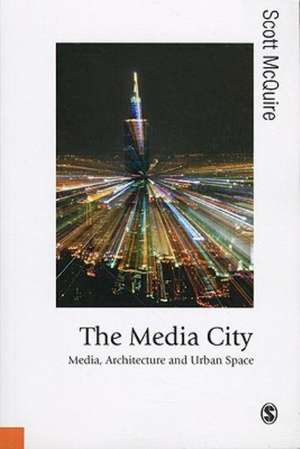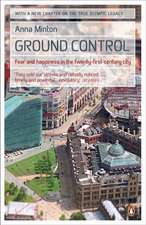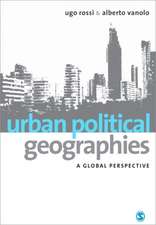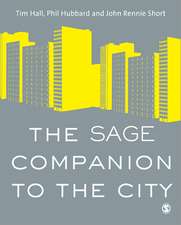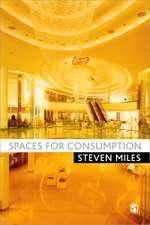The Media City: Media, Architecture and Urban Space: Published in association with Theory, Culture & Society
Autor Scott McQuireen Limba Engleză Paperback – 13 iun 2010
- John Hutnyk, Goldsmiths, University of London
"Just when you thought the last word had been said about cities and media, along comes Scott McQuire to breathe new life into the debate. When revisiting existing pathways, his always ingenious eyes produce startling and original insights. When striking out into new territory, he opens up before us inspiring new vistas. I love this book."
- James Donald, University of New South Wales
"A book that crams into a single chapter more insights and illustrations than seems feasible, yet which ties all threads together through a consistent, theoretically rich analysis of the interplay of media and city... Writing with effusiveness uncharacteristic of back-cover blurbs on academic tomes, James Donald says 'I love this book'. But I will end by echoing his praise, and make a promise to readers: you will love The Media City, too."
- European Journal of Communication
"Refreshingly clear, getting to grips with some of the key concepts of urban sociology in a way that moves beyond the wistful evocation and splatter of undigested terms that characterises so much academic writing on culture and cities."
- Media, Culture & Society
Significant changes are occurring in the spaces and rhythms of contemporary cities and in the social functioning of media. This forceful book argues that the redefinition of urban space by mobile, instantaneous and pervasive media is producing a distinctive mode of social experience.
Media are no longer separate from the city. Instead the proliferation of spatialized media platforms has produced a media-architecture complex - the media city. Offering critical and historical analysis at the deepest levels, The Media City links the formation of the modern city to the development of modern image technologies and outlines a new genealogy for assessing contemporary developments such as digital networks and digital architecture, web cams and public screens, surveillance society and reality television. Wide-ranging and thoughtfully illustrated, it intersects disciplines and connects phenomena which are too often left isolated from each other to propose a new way of understanding public and private space and social life in contemporary cities. It will find a broad readership in media and communications, cultural studies, social theory, urban sociology, architecture and art history.
Winner of the 2009 Jane Jacobs Urban Communication Award, awarded by the Urban Communication Association.
| Toate formatele și edițiile | Preț | Express |
|---|---|---|
| Paperback (1) | 446.21 lei 6-8 săpt. | |
| SAGE Publications – 13 iun 2010 | 446.21 lei 6-8 săpt. | |
| Hardback (1) | 1203.04 lei 6-8 săpt. | |
| SAGE Publications – 20 feb 2008 | 1203.04 lei 6-8 săpt. |
Din seria Published in association with Theory, Culture & Society
-
 Preț: 189.83 lei
Preț: 189.83 lei -
 Preț: 444.21 lei
Preț: 444.21 lei -
 Preț: 443.02 lei
Preț: 443.02 lei -
 Preț: 393.44 lei
Preț: 393.44 lei -
 Preț: 280.42 lei
Preț: 280.42 lei -
 Preț: 443.94 lei
Preț: 443.94 lei -
 Preț: 392.73 lei
Preț: 392.73 lei - 8%
 Preț: 445.19 lei
Preț: 445.19 lei -
 Preț: 307.51 lei
Preț: 307.51 lei -
 Preț: 426.59 lei
Preț: 426.59 lei - 22%
 Preț: 372.33 lei
Preț: 372.33 lei -
 Preț: 394.44 lei
Preț: 394.44 lei - 18%
 Preț: 1491.48 lei
Preț: 1491.48 lei - 15%
 Preț: 480.56 lei
Preț: 480.56 lei - 15%
 Preț: 475.52 lei
Preț: 475.52 lei - 15%
 Preț: 486.73 lei
Preț: 486.73 lei - 18%
 Preț: 1364.13 lei
Preț: 1364.13 lei - 18%
 Preț: 1536.08 lei
Preț: 1536.08 lei - 18%
 Preț: 1491.65 lei
Preț: 1491.65 lei - 15%
 Preț: 487.56 lei
Preț: 487.56 lei - 15%
 Preț: 479.46 lei
Preț: 479.46 lei - 15%
 Preț: 479.78 lei
Preț: 479.78 lei - 15%
 Preț: 431.90 lei
Preț: 431.90 lei - 15%
 Preț: 487.05 lei
Preț: 487.05 lei - 18%
 Preț: 1229.47 lei
Preț: 1229.47 lei - 26%
 Preț: 926.68 lei
Preț: 926.68 lei - 18%
 Preț: 1234.14 lei
Preț: 1234.14 lei - 15%
 Preț: 480.44 lei
Preț: 480.44 lei -
 Preț: 479.85 lei
Preț: 479.85 lei - 15%
 Preț: 479.27 lei
Preț: 479.27 lei - 18%
 Preț: 1203.04 lei
Preț: 1203.04 lei - 15%
 Preț: 479.13 lei
Preț: 479.13 lei - 18%
 Preț: 1126.63 lei
Preț: 1126.63 lei - 18%
 Preț: 1234.14 lei
Preț: 1234.14 lei - 15%
 Preț: 478.44 lei
Preț: 478.44 lei - 15%
 Preț: 478.12 lei
Preț: 478.12 lei - 15%
 Preț: 448.04 lei
Preț: 448.04 lei - 18%
 Preț: 1321.90 lei
Preț: 1321.90 lei - 18%
 Preț: 1180.15 lei
Preț: 1180.15 lei - 19%
 Preț: 419.04 lei
Preț: 419.04 lei - 18%
 Preț: 886.71 lei
Preț: 886.71 lei - 18%
 Preț: 1182.37 lei
Preț: 1182.37 lei - 18%
 Preț: 1321.58 lei
Preț: 1321.58 lei - 18%
 Preț: 1074.21 lei
Preț: 1074.21 lei - 15%
 Preț: 428.79 lei
Preț: 428.79 lei -
 Preț: 482.14 lei
Preț: 482.14 lei - 15%
 Preț: 466.03 lei
Preț: 466.03 lei - 18%
 Preț: 1141.40 lei
Preț: 1141.40 lei -
 Preț: 477.89 lei
Preț: 477.89 lei
Preț: 446.21 lei
Nou
Puncte Express: 669
Preț estimativ în valută:
85.38€ • 89.15$ • 70.51£
85.38€ • 89.15$ • 70.51£
Carte tipărită la comandă
Livrare economică 16-30 aprilie
Preluare comenzi: 021 569.72.76
Specificații
ISBN-13: 9780857025371
ISBN-10: 0857025376
Pagini: 240
Dimensiuni: 156 x 234 x 15 mm
Greutate: 0.38 kg
Ediția:1
Editura: SAGE Publications
Colecția Sage Publications Ltd
Seria Published in association with Theory, Culture & Society
Locul publicării:London, United Kingdom
ISBN-10: 0857025376
Pagini: 240
Dimensiuni: 156 x 234 x 15 mm
Greutate: 0.38 kg
Ediția:1
Editura: SAGE Publications
Colecția Sage Publications Ltd
Seria Published in association with Theory, Culture & Society
Locul publicării:London, United Kingdom
Recenzii
If only more new media commentators had this level of historical-critical reference, engaging, good stories, and a degree of wonder at what media and windows bring to the city, to life...
John Hutnyk
Academic Director, Centre for Cultural Studies, Goldsmiths University of London
Just when you thought the last word had been said about cities and media, along comes Scott McQuire to breathe new life into the debate. When revisiting existing pathways, his always ingenious eyes produce startling and original insights. When striking out into new territory, he opens up before us inspiring new vistas. I love this book
James Donald
Professor of Film Studies, University of New South Wales
A book that contains sometimes audacious segues, that crams into a single chapter more insights and illustrations than seems feasible, yet which ties all threads together through a consistent, theoretically rich analysis of the interplay of media and city... Writing with effusiveness uncharacteristic of back-cover blurbs on academic tomes, James Donald says "I love this book". But I will end by echoing his praise, and make a promise to readers: you will love The Media City, too
European Journal of Communication
Compared to the urban studies literature of say David Harvey or Ed Soja, McQuire writes with a much greater architectural sensibility. His argument is that we move from a rather centred space of the classical renaissance city to a 'relational space' where past and future are juxtaposed not in simple Newtonian chronology but in complex relation to present. Such a transformed urbanism and media (compared with say Renaissance and Beaux Arts perspective) moves from what might be seen as the panoptic to a serial succession of photographic shots, of film frames, of movements along vistas at speed.
At stake is a city that is continually redefined by the media and understood along the lines of McQuire's quite novel media theory. At stake is a vision of media, which are too ubiquitous in the multiplication of screens, surveillance and other devices/interfaces in private and public space to primarily function any more as representations. Media in this (McQuire's) context are no longer primarily a set of representations, but constitute the very substance and fabric of urban public and private space
Scott Lash
Goldsmiths, University of London
…refreshingly clear, getting to grips with some of the key concepts of urban sociology in a way that moves beyond the wistful evocation and splatter of undigested terms that characterises so much academic writing on culture and cities… a clear historical and theoretically informed look at the city over the last 200 years… give us one of the most cogent accounts we have had for some time
Media, Culture & Society
[A]n in-depth analysis that draws upon a melange of psychoanalytical, sociological and cultural theory... The Media City is undoubtedly an accomplished work and offers a substantial piece of scholarship
Information, Communication and Society
John Hutnyk
Academic Director, Centre for Cultural Studies, Goldsmiths University of London
Just when you thought the last word had been said about cities and media, along comes Scott McQuire to breathe new life into the debate. When revisiting existing pathways, his always ingenious eyes produce startling and original insights. When striking out into new territory, he opens up before us inspiring new vistas. I love this book
James Donald
Professor of Film Studies, University of New South Wales
A book that contains sometimes audacious segues, that crams into a single chapter more insights and illustrations than seems feasible, yet which ties all threads together through a consistent, theoretically rich analysis of the interplay of media and city... Writing with effusiveness uncharacteristic of back-cover blurbs on academic tomes, James Donald says "I love this book". But I will end by echoing his praise, and make a promise to readers: you will love The Media City, too
European Journal of Communication
Compared to the urban studies literature of say David Harvey or Ed Soja, McQuire writes with a much greater architectural sensibility. His argument is that we move from a rather centred space of the classical renaissance city to a 'relational space' where past and future are juxtaposed not in simple Newtonian chronology but in complex relation to present. Such a transformed urbanism and media (compared with say Renaissance and Beaux Arts perspective) moves from what might be seen as the panoptic to a serial succession of photographic shots, of film frames, of movements along vistas at speed.
At stake is a city that is continually redefined by the media and understood along the lines of McQuire's quite novel media theory. At stake is a vision of media, which are too ubiquitous in the multiplication of screens, surveillance and other devices/interfaces in private and public space to primarily function any more as representations. Media in this (McQuire's) context are no longer primarily a set of representations, but constitute the very substance and fabric of urban public and private space
Scott Lash
Goldsmiths, University of London
…refreshingly clear, getting to grips with some of the key concepts of urban sociology in a way that moves beyond the wistful evocation and splatter of undigested terms that characterises so much academic writing on culture and cities… a clear historical and theoretically informed look at the city over the last 200 years… give us one of the most cogent accounts we have had for some time
Media, Culture & Society
[A]n in-depth analysis that draws upon a melange of psychoanalytical, sociological and cultural theory... The Media City is undoubtedly an accomplished work and offers a substantial piece of scholarship
Information, Communication and Society
Cuprins
Introduction
The Uncanny Home
PART ONE: THRESHOLDS OF THE MEDIA CITY
The Territory of Images
The City in Fragments
Liquid Cities
PART TWO: PUBLIC SPACE: STREETS, LIGHTS AND SCREENS
Electropolis
Performing Public Space
PART THREE: PRIVATE SPACE: FROM GLASS ARCHITECTURE TO BIG BROTHER
The Glass House
The Digital Home
Conclusion
The Uncanny Home
PART ONE: THRESHOLDS OF THE MEDIA CITY
The Territory of Images
The City in Fragments
Liquid Cities
PART TWO: PUBLIC SPACE: STREETS, LIGHTS AND SCREENS
Electropolis
Performing Public Space
PART THREE: PRIVATE SPACE: FROM GLASS ARCHITECTURE TO BIG BROTHER
The Glass House
The Digital Home
Conclusion
Notă biografică
Scott McQuire completed his PhD in the Politics Department at the University of Melbourne in 1995. He has a strong interest in interdisciplinary research and has lectured in disciplines including politics, sociology, cinema studies, art and architecture, and media and communication. Scott has held a number of research fellowships including a visiting fellowship at the Department of Film, Theatre and Television, UCLA (1998), an ARC Australian Postdoctoral Fellowship (1999-2000), and a visiting fellowship at the Celeste Bartos International Film Study Center, Museum of Modern Art, New York (2000). He returned to the University of Melbourne to help establish the Media and Communication Programme in 2001. He is an active researcher who has been a Chief Investigator on six Australian Research Council funded projects. He has also received funding from the Australia Council for the Arts, and has undertaken research consultancies for the Communications Law Centre, the Australian Film Commission and the Australian Key Centre for Media and Cultural Policy.
Descriere
In response to lecturer demand, this is a paperback edition of Scott McQuire's critically acclaimed exploration of the social spaces of modern cities.
